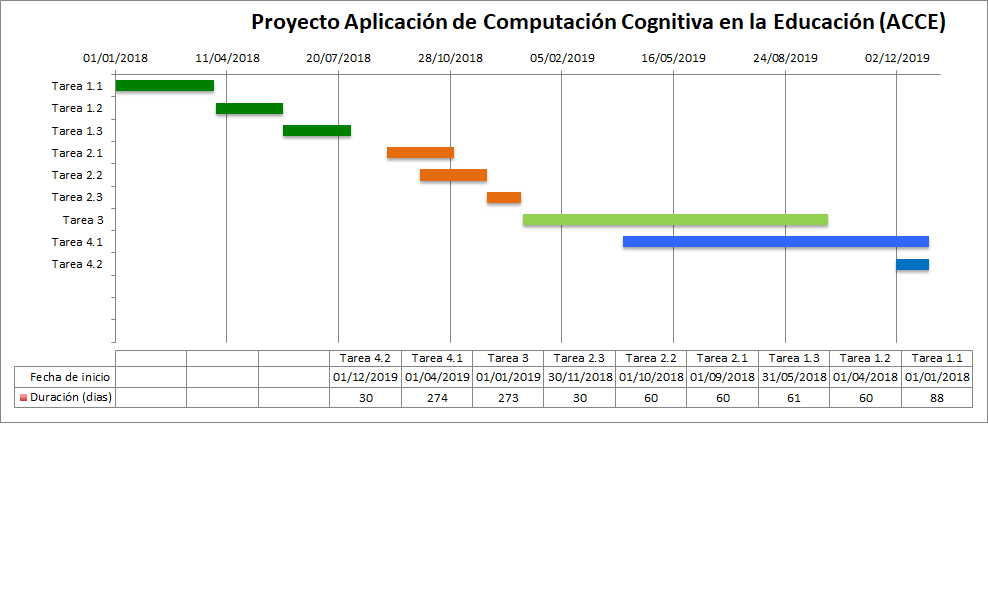Work Plan
1.- DESIGN AND PRODUCTION OF TRAINING CONTENT CCP (Computational Cognitive Primitives)
1.1.-Self-training: the members of the project team (professors of the Teaching School and the School of Engineering) will self-study in the study of the Computational Cognitive Primitives applied to curricular subjects.
1.2.- Creation of CCP Content: Afterwards, the team will design and produce CCP training contents in the context of university training for students of Teaching and Engineering. The project will be collaborative between teachers and students to attend coordinated proposals among all.
2.- IMPLEMENTATION IN THE CLASSROOM.
2.1.- CCP content delivery: the teaching team will teach the CCP contents in the classroom so that the student as a recipient of teaching material with CCP becomes familiar and makes use of teaching materials designed with CCP for the development of their learning process. Students will be given several questionnaires to apply the CCP in different problems and situations. They will also be asked for their assessment of the quality, usefulness and level of use of the material.
2.2.- Student body creating CCP content: students as a producer of teaching material with CCP will design and create teaching material with CCP for another group of students involved in the PIE. Each group of students will be presented with a challenge linked to the needs of other learners. This way he will have to investigate, ask and create giving solution to that challenge.
In addition, both engineering and education students collaboratively and jointly, under the direction of the teachers in the PIE and teachers of Secondary Education of the Dominican Republic, will create teaching materials CCP for secondary students of educational centers in the Dominican Republic. The teaching staff in charge of said country will put into practice the materials with their students in different areas of knowledge (mathematics, robotics, etc.).
2.3.- Delivery of CCP contents made by the students. The student will become a recipient of teaching material with CCP. A material constructed by other students and that the authors will present and guide in their use. To this end, online communication channels will be created, saving the physical distance that characterizes the group of undergraduate and graduate students involved in the PIE. Students will be given several questionnaires designed by the teaching team and students to apply the CCPs in different problems and situations. They will also be asked for their assessment of the quality, usefulness and level of use of the material. In addition, all the students involved will describe the level of satisfaction with the general task performed and their degree of motivation in relation to the challenge and the usefulness of using and building teaching materials with CCP. The Secondary Education students will become the recipient of the material created under the guidance of their teachers.
3.- ANALYSIS AND RESULTS: Statistical analyzes of the records collected in the different questionnaires carried out during the tasks of the Implementation will be carried out. Both quantitative and qualitative data on the innovation proposed will be treated and analyzed with SPSS-type tools. The effectiveness of the contents with CCP and the level of satisfaction and motivation will be analyzed in relation to the proposed challenge and the usefulness of using and constructing didactic material of the contents with CCP to learn in the university.
In this section we believe it is important to highlight that the students and teachers will work fundamentally coordinated in interdisciplinary groups and communicate in a virtual way. In this way it is intended to train all participants in the use of new forms of communication and online collaborative work, key competences for the current and future society. It stands out that both the faculty and students of the UPV / EHU that participates are located in remote locations within the campus (Leioa / Bilbao) and the external collaboration will be with active teachers and students from different educational stages of the Dominican Republic.
4.- DIFFUSION RESULTS: A final report describing the design, implementation and results publicized to the university community will be written; the experience and the results obtained will be disseminated in congresses and articles in journals of educational innovation.


